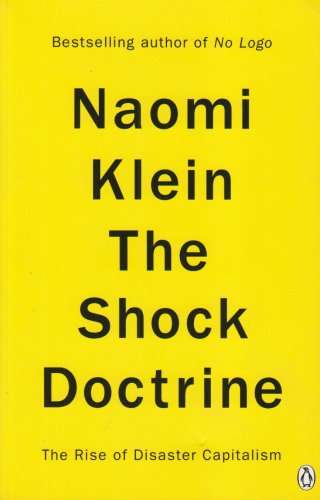
The Shock Doctrine: The Rise of Disaster Capitalism
Check my rate
| Main centres: | 1-3 business days |
| Regional areas: | 3-4 business days |
| Remote areas: | 3-5 business days |

| Main centres: | 1-3 business days |
| Regional areas: | 3-4 business days |
| Remote areas: | 3-5 business days |
Published by Penguin Books , 2007, softcover, index, 558 pages, condition: very good.
In this groundbreaking book, the bestselling author of No Logo exposes the gripping story of how Americas free market policies have come to dominate the world through the exploitation of disaster-shocked people and countries. At the most chaotic juncture in Iraqs civil war, a new law is unveiled that would allow Shell and BP to claim the countrys vast oil reserves Immediately following September 11, the4 Bush Administration quietly out-sources the running of the War on Terror to Halliburton and Blackwater. After a powerful tsunami devastates the coasts of Southeast Asia, the pristine beaches are auctioned off to tourist resorts. New Orleanss residents, still scattered from Hurricane Katrina, discover that their public housing, hospitals and schools will never be reopened. These events are examples of what Naomi Klein calls the shock doctrine: the use of public disorientation following massive collective shocks wars, terrorist attacks, natural disasters to push through unpopular economic measures often call shock therapy.
The Shock Doctrine - The Rise of Disaster Capitalism is an eye-opening, scathing critique of neo-liberalism and corporatism. Klein extensively examines disaster capitalism complex - a new form of economy built on fear in the wake of a mind-numbing crisis. Based on Nobel laureate Milton Friedman and the Chicago boys' economic theory, disaster capitalism involves the implementation of unpopular, radical free market reforms by exploiting the period of collective shock right after a national crisis during which the population's attention is diverted and their reactive capacities are numbed.
The Chicago boys were a group of Chilean economists prominent around the 1970s and the 1980s, and the majority of them were educated/trained at the Department of Economics of the University of Chicago. Although I am not well acquainted with the theory, from what I have gathered, Friedman advocated developing "alternatives to existing policies, to keep them alive and available until the politically impossible becomes politically inevitable" during or immediately after a crisis. Friedmanites stockpile free market ideas and impose them swiftly after a crisis so that they are mostly irreversible.
The first laboratory for Friedman school of economics was Latin America - where military dictatorships were largely in place back in the 70s and 80s. Friedmanites' ideas have mostly aligned with the interests of multinational corporations and over the past fifty years, we have witnessed an upheaval of economic systems all over the world and particularly in global south. The repercussions of disaster capitalism have been overwhelmingly devastating - an ever-widening chasm between the rich and the poor, enormous debt accumulations, enormous private wealth accumulations, irreversible damage to the ecological and environmental system, widespread poverty, destitution and hunger.
I read this book over one month in October during which I also read a large number of reports on pandemic profiteering from all over the world. In India, billionaire and corporatist Mukesh Ambani's net worth grew by Rs 2000 crore per day since March 23, 2020 while nearly 40 crore Indian workers are projected to sink into poverty due to covid-19. Nine Indian billionaires have as much wealth as 50% of the Indian population. Globally, the top 25 billionaires increased their wealth by 255 billion dollars between mid-March and May and 32 of the world's most profitable companies are together expected to make 109 billion dollars more than the average of their profits in the last four years. Also, the 'pandemic profits' of these 32 companies could be redeployed in funding global covid-19 testing needs (estimated at 6 billion dollars) and delivering vaccines to everyone on the planet (estimated at 71 billion dollars.)
Klein's book is extremely important and now more than ever. It is a must-read.